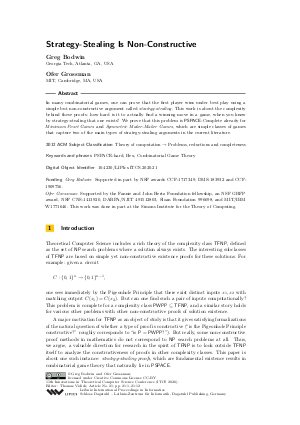Strategy-Stealing Is Non-Constructive
Authors Greg Bodwin, Ofer Grossman
-
Part of:
Volume:
11th Innovations in Theoretical Computer Science Conference (ITCS 2020)
Part of: Series: Leibniz International Proceedings in Informatics (LIPIcs)
Part of: Conference: Innovations in Theoretical Computer Science Conference (ITCS) - License:
 Creative Commons Attribution 3.0 Unported license
Creative Commons Attribution 3.0 Unported license
- Publication Date: 2020-01-06
File

PDF
LIPIcs.ITCS.2020.21.pdf
- Filesize: 0.52 MB
- 12 pages
Document Identifiers
Subject Classification
ACM Subject Classification
- Theory of computation → Problems, reductions and completeness
Keywords
- PSPACE-hard
- Hex
- Combinatorial Game Theory
Metrics
- Access Statistics
-
Total Accesses (updated on a weekly basis)
0Document
0Metadata
Abstract
In many combinatorial games, one can prove that the first player wins under best play using a simple but non-constructive argument called strategy-stealing. This work is about the complexity behind these proofs: how hard is it to actually find a winning move in a game, when you know by strategy-stealing that one exists? We prove that this problem is PSPACE-Complete already for Minimum Poset Games and Symmetric Maker-Maker Games, which are simple classes of games that capture two of the main types of strategy-stealing arguments in the current literature.
Cite As Get BibTex
Greg Bodwin and Ofer Grossman. Strategy-Stealing Is Non-Constructive. In 11th Innovations in Theoretical Computer Science Conference (ITCS 2020). Leibniz International Proceedings in Informatics (LIPIcs), Volume 151, pp. 21:1-21:12, Schloss Dagstuhl – Leibniz-Zentrum für Informatik (2020)
https://doi.org/10.4230/LIPIcs.ITCS.2020.21
BibTex
@InProceedings{bodwin_et_al:LIPIcs.ITCS.2020.21,
author = {Bodwin, Greg and Grossman, Ofer},
title = {{Strategy-Stealing Is Non-Constructive}},
booktitle = {11th Innovations in Theoretical Computer Science Conference (ITCS 2020)},
pages = {21:1--21:12},
series = {Leibniz International Proceedings in Informatics (LIPIcs)},
ISBN = {978-3-95977-134-4},
ISSN = {1868-8969},
year = {2020},
volume = {151},
editor = {Vidick, Thomas},
publisher = {Schloss Dagstuhl -- Leibniz-Zentrum f{\"u}r Informatik},
address = {Dagstuhl, Germany},
URL = {https://drops.dagstuhl.de/entities/document/10.4230/LIPIcs.ITCS.2020.21},
URN = {urn:nbn:de:0030-drops-117069},
doi = {10.4230/LIPIcs.ITCS.2020.21},
annote = {Keywords: PSPACE-hard, Hex, Combinatorial Game Theory}
}
Author Details
Funding
- Bodwin, Greg: Supported in part by NSF awards CCF-1717349, DMS-183932 and CCF-1909756.
- Grossman, Ofer: Supported by the Fannie and John Hertz Foundation fellowship, an NSF GRFP award, NSF CNS-1413920, DARPA/NJIT 491512803, Sloan Foundation 996698, and MIT/IBM W1771646. This work was done in part at the Simons Institute for the Theory of Computing.
References
- Wining situation on a Hex Board. URL: https://en.wikipedia.org/wiki/Hex_(board_game)#/media/File:Hex-board-11x11-(2).jpg.
-
József Beck. Van der Waerden and Ramsey type games. Combinatorica, 1(2):103-116, 1981.

-
József Beck. Positional games and the second moment method. Combinatorica, 22(2):169-216, 2002.

-
József Beck. Combinatorial Games: Tic-Tac-Toe Theory, volume 114. Cambridge University Press, 2008.

-
Jesper Makholm Byskov. Maker-maker and maker-breaker games are PSPACE-complete. BRICS Report Series, 11(14), 2004.

-
Paul Erdös and John L Selfridge. On a combinatorial game. Journal of Combinatorial Theory, Series A, 14(3):298-301, 1973.

-
Heidi Gebauer. On the clique-game. European Journal of Combinatorics, 33(1):8-19, 2012.

-
Solomon W Golomb and Alfred W Hales. Hypercube tic-tac-toe. More Games of No Chance, 42:167-180, 2002.

-
Daniel Grier. Deciding the winner of an arbitrary finite poset game is PSPACE-Complete. In International Colloquium on Automata, Languages, and Programming, pages 497-503. Springer, 2013.

-
Alfred W Hales and Robert I Jewett. Regularity and positional games. In Classic Papers in Combinatorics, pages 320-327. Springer, 2009.

-
Dan Hefetz, Michael Krivelevich, Miloš Stojaković, and Tibor Szabó. Positional Games. Springer, 2014.

-
Christopher Kusch. Problems in Positional Games and Extremal Combinatorics. PhD thesis, FU Berlin, 2017.

-
Christopher Kusch, Juanjo Rué, Christoph Spiegel, and Tibor Szabó. Random strategies are nearly optimal for generalized Van der Waerden games. Electronic Notes in Discrete Mathematics, 61:789-795, 2017.

-
Nimrod Megiddo and Christos H Papadimitriou. On total functions, existence theorems and computational complexity. Theoretical Computer Science, 81(2):317-324, 1991.

-
John F Nash. Some games and machines for playing them, 1952.

-
Stefan Reisch. Hex ist PSPACE-Vollständig. Acta Informatica, 15(2):167-191, 1981.

-
Bartel van der Waerden. Beweis einer baudetschen vermutung. Nieuw Arch. Wisk., 19:212-216, 1927.

